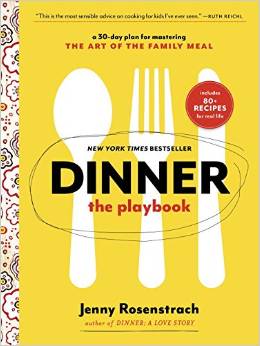 Dinner: The Playbook: a 30-day plan for mastering The Art of the Family Meal by Jenny Rosenstrach, Ballantine Books, 2014.
Dinner: The Playbook: a 30-day plan for mastering The Art of the Family Meal by Jenny Rosenstrach, Ballantine Books, 2014.
I talk in chapter 8 of my book (read it here) that one of my “small things” goals is to plan dinner ahead of time; that, while I’m good at entertaining and planning party food, we often rather limp along through the week’s normal family meals. (Although I am a killer breakfast maker, I must say.) Jenny Rosenstrach’s previous book, Dinner: A Love Story, is referenced there. I ran across that book at the library, liked it, and have visited her blog of the same name several times, which is how I found out about her new book. DALS is a lovely cookbook with many photographs of Jenny’s family; this book is more of a battle plan with recipes included. I have to say that I find most of her recipes to be rather weird and her meals a little on the skimpy side: spaghetti with shallots and Brussels sprouts? really? as the whole meal, not a side dish?
(Her husband Andy does give some comments on the blog about this book and says to be extremely wary about what her idea of a “serving” is.) I doubt very much that I’ll be making many of these dishes.
HOWEVER, the recipes are not the point. Indeed, while I’m sure she didn’t intend this, her first few chapters are actually a manifesto on running your life in a proactive fashion, taking charge instead of falling behind, a great kick in the pants for the procrastinator in all of us (especially me). So, within the context of dinner prep, she lays out principles that fit into any ongoing endeavor, and the main one is:
Always be thinking ahead. In fact, if there’s only one idea you can glean from this review, it would be this question that Rosenstrach brings up several times: “What can I do right now to get ahead for the week?” Or, put more simply, “What can I do right now?” I’ve found myself asking this as the week has progressed. I’m writing this on Wednesday, during a week leading up to a chorale concert, which means two rehearsals and two performances, plus my usual frenzied preparation for the Friday-night reception. (Yet another reason to come to our concerts! Have you checked out the CCC page here?) In the midst of this we just had a very nice dinner that I planned out ahead of time and looked forward to all day. (Sesame Spiced Turkey Meatballs from the Smitten Kitchen, another great resource, with a chickpea salad, some cucumbers, and a tahini sauce.) I don’t have to go anywhere tonight, so I planned a more complicated meal. Tomorrow will be some kind of soup, probably pumpkin with smoked gouda cheese, since I have another rehearsal, with rolls and a salad. Usually on nights like that I’m frantically throwing something together or saying to the guys, “You’re on your own for dinner,” which is certainly okay at least some of the time but which happens far too often around here.
Rosenstrach makes the point that the simplest thing done ahead will get you to go ahead and do what you said you’d do when the pressure is on and you’re tempted to slap a frozen pizza in the oven. So, for instance, if you’re having pasta, she recommends filling a pot with water and putting it on the stove before you leave for the day. Sounds kind of dumb, doesn’t it? But it’s the same reasoning that says you’re more likely to go for your walk or run if your running shoes are by the door, more likely to dust if you have a dustcloth in the room, etc. You’ve done something ahead of time, something that will spur you on. Such a simple, simple, idea, and so powerful.
And I’ve made a new resolution that’s not taken directly from this book but was inspired by it: I’m going to stop overbuying. There’s been a certain tendency on my part to, yes, fail to plan ahead about dinner and then freak out at 5:00, but then there’s also the tendency to try to put together a meal that will use up some ingredient that’s moldering away in the fridge. And often it’s just not possible to rescue these items and they end up being tossed. So buying something perishable and non-freezable at Costco in an effort to save money actually costs us more. If I’ve planned out the week’s meals ahead of time and shopped accordingly, then I will have bought only what I can use. What an idea! It’s very satisfying to me to use something up well. And you’d be using up your time well to read at least the first three chapters: “Introduction,” “The Rules,” and “How to Get Started.” Even if you don’t cook (and why don’t you?), I guarantee that you’ll find ideas that you can apply to your life as a whole. You go, Jenny!